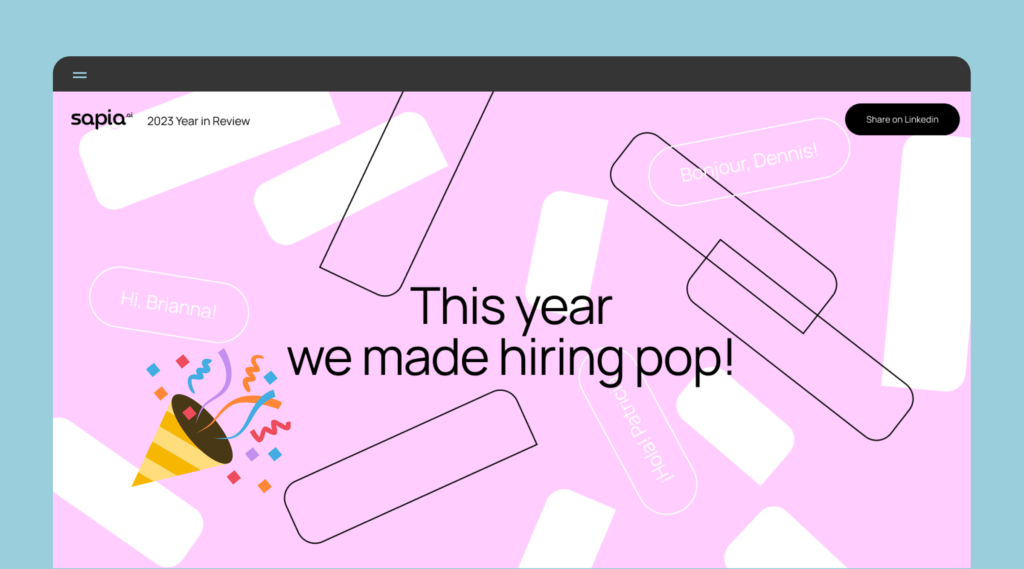2023: A Bubbly Year In Hiring 🥂


In 2023, the world embraced the transformative power of artificial intelligence (AI) more than ever before. With the explosion of ChatGPT into individuals’ pockets at the end of last year, we’ve seen interest and trust in AI solutions from organizations skyrocket.
The year 2023 stands as a testament to the potential of AI in creating an enriched, unbiased, and empowering hiring experience.
We’ve compiled the highlights that have made this year our most exciting so far – click the button below to immerse yourself in the year that’s been.

The Sapia.ai Difference: Our Candidate Experience
Numbers speak louder than words. And our 2023 candidate numbers resound with success. Almost 1.4 million candidates shared their stories this year in a Chat Interview, giving every one of them a fair and equal chance at success.
450,000 candidates completed a Video Interview, giving them the chance to share more about who they are, and enabling hiring teams to ‘meet’ shortlisted candidates at a time that suited them.
Of the candidates who started a Chat Interview, 91.8% completed it, showing that candidates appreciate the opportunity to open up and bring their real and best selves when applying for a job.
The impact that allowing candidates to interview, and receive personalised feedback that they can use in their lives and careers, is huge.
Not only did 96% of candidates find the feedback they received useful, but the follow-on effect to our customer’s brands is a testament to the visionary talent leaders seeing the benefits of investing in their candidate experience.
79% employer brand advocacy and 84% consumer brand advocacy show how a candidate’s experience with AI, when curated in a respectful, low-pressure way, can positively impact your consumer brand.

Reducing Bias: A Key Achievement in 2023
One of the most significant pillars of our mission that we’re proud of is our unwavering commitment to reducing bias in the hiring process. In 2023, we’ve made substantial strides in ensuring that every candidate gets a fair chance, regardless of their background, making the hiring process more equitable and just.
In March of 2023, independent research was published that underscored the transformative impact of Sapia.ai in workplaces. The study highlighted how our platform significantly reduces the gender gap in technology hiring, a traditionally male-dominated sector. This research serves as a testament to our commitment to fostering diversity and inclusion, and our unwavering pursuit to level the playing field in the recruitment process.
The strides we’ve made with Sapia.ai are not just about challenging the status quo; they are about shaping a future where opportunities are boundless, and talent is recognized, irrespective of gender, ethnicity, age, or any other irrelevant piece of information about a person other than their potential to perform in the role.

Customer Impact: The True Measure of Our Success
Our customer’s satisfaction is the heartbeat of Sapia.ai. And in 2023, the pulse is strong. Our customer testimonials echo our commitment to excellence in the hiring process. They tell a story of transformed hiring experiences, saved time and resources, and how Sapia.ai has been a game-changer for businesses.
You can read our testimonials in our Year in Review highlight here.
By automating the screening and assessment of candidates, we’ve made a remarkable difference in streamlining the recruitment process. This year, we’re proud to share that we’ve saved each recruiter and hiring manager who uses Sapia.ai almost 30 hours per month. This has not only led to improved efficiency but has allowed hiring teams to focus more on their people. The time saved translates to increased productivity, enhanced candidate experience, and a more personable approach to hiring.
New Customer Partnerships: Strengthening Our Reach in 2023
This year, we had the pleasure of welcoming some esteemed brands to our growing network. These organizations are not just our valued clients; they are visionary leaders who embrace Responsible AI to make the hiring process better and more equitable.
We’re proud to collaborate with Kmart and Target Australia, global entities renowned for their commitment to diversity and fairness. Starbucks Australia, another of our prestigious customers, is making strides in efficient, responsible hiring practices with our platform. We’re also excited about our global partnerships with Joe & the Juice, a dynamic and innovative brand with a presence across the UK, Europe, and the US; Edge, an American organization known for its forward-thinking leadership; and Ecentric Payments, a pioneer in the South African digital payment solutions sector.
These partnerships demonstrate our shared vision to transform the hiring landscape, making it fairer and more efficient for all.

Expanding Our Integrations in 2023
This year, we also made meaningful strides in strengthening our partnerships with other major organizations in the HR space.
We’re thrilled to announce the successful completion of our integrations this year with SAP SuccessFactors, LiveHire, iCIMS, and Avature.
These partnerships have been instrumental in expanding our reach and capabilities. Through these integrations, we can now offer a seamless, comprehensive experience encompassing every stage of the hiring process for users of these platforms.
This simplifies the recruitment workflow and ensures a smooth, hassle-free journey for both candidates and hiring teams.

Product Innovations of 2023
In April we introduced our multilingual capability, starting with French and Spanish, and rapidly expanding to Danish, Dutch, Finnish, German, Italian, and Swedish. This significant expansion in our language offering for candidates facilitates easier communication for speakers of languages other than English fostering inclusivity and paving the way for a more diverse talent pool. The ability to accommodate various languages is instrumental in meeting our goal of making hiring equitable and accessible on a global scale.
In July we uplifted the review section of our Video Interviews, enabling a panel-style review process with multi-assessor capability. With new permissions sets that ensure hiring managers can only see their ratings, this feature helps to reduce the possibility of conformity bias, encouraging hiring managers to rate candidates solely based on their perspective and not be influenced by others’ opinions.
Also in July, we achieved a significant milestone with the development of our first proprietary large language model, which played a crucial role in the creation of our innovative Artificially Generated Text Detector. This language model, built with advanced machine-learning techniques, represents a significant leap forward in our commitment to innovation in AI. It can differentiate human-like text from artificially generated text, thanks to our large collection of human answers.
The detector can efficiently and effectively scan for artificial content, created with tools like ChatGPT. This innovative feature has been instrumental in ensuring the authenticity of our Chat Interview, reducing plagiarism by an astounding 78% almost overnight. By curbing plagiarism, we ensure each candidate has a fair opportunity to showcase their unique skills and competencies; and preserve the integrity of our platform in maintaining fairness in the recruitment process.
In October we launched Talent Hub, a game-changing feature that has accelerated the shortlisting process for recruiters and hiring managers. This tool provides a central hub for all Sapia.ai insights and data, reducing the clicks to review and progress a candidate by an impressive 75%. Now, the entire recruitment process is faster, smoother, and more efficient than ever before.
This month we released SMS reminders, which will help to boost our already industry-leading completion rates, enabling our customers to assess a broader talent pool.
Lastly, one of the most exciting innovations to have kicked off in 2023 was the proof of concept of Phai, our career site chatbot powered by generative AI.
Our customers have been crying out for us to bring the power of chat earlier in the candidate journey, connecting with candidates on a personalized level from the moment they land on the career site. Phai is the first step in this direction, with general availability slated for Q1, 2024; and a roadmap of functionality planned that will elevate the candidate experience even further.
To interact with Phai, simply click the chat button on the bottom left of your browser window.
Global Recognition: Our Scientific Research
In 2023, our efforts in scientific research and practical application of AI garnered global recognition, amplifying our commitment to innovation and responsible AI. We were profoundly honored to have had the opportunity to present four research papers at the 2023 Society for Industrial and Organizational Psychology (SIOP) annual conference, the leading global event for I/O psychologists.
This recognition underscores our dedication to rigorous scientific research and our quest for knowledge, driving us to continue exploring new frontiers. We are also thrilled to announce the news that 6 research papers from Sapia.ai have been accepted for presentations at the 2024 SIOP conference and a poster at the NVIDIA GTC conference, one of the leading venues for showcasing Gen AI innovations.
Moreover, our work has been acknowledged by the National AI Centre in Australia, emphasized in a recent paper on the country’s expanding AI ecosystem. This recognition serves as a testament to our impactful contributions to the Responsible AI ecosystem in Australia and beyond. It also highlights our pivotal role in shaping the future of AI and its practical applications, further reinforcing our commitment to enhancing the recruitment process using ethical AI.
Looking Forward to 2024
As we reflect on an extraordinary 2023, we’re filled with immense gratitude for our partnerships, innovations, and recognitions that have shaped the year.
Leaping into 2024, we have some incredibly exciting plans shaping up that will elevate the experience for candidates and hiring teams and move us closer to achieving our mission of using ethical AI to make hiring fairer, more efficient, and more effective.


